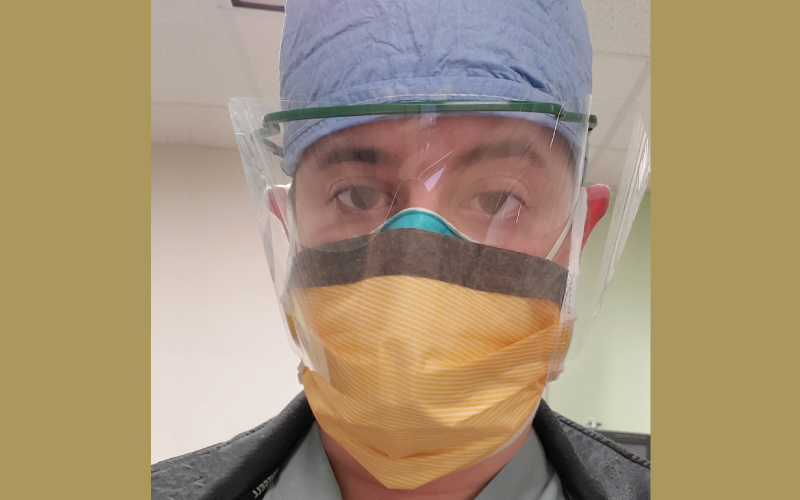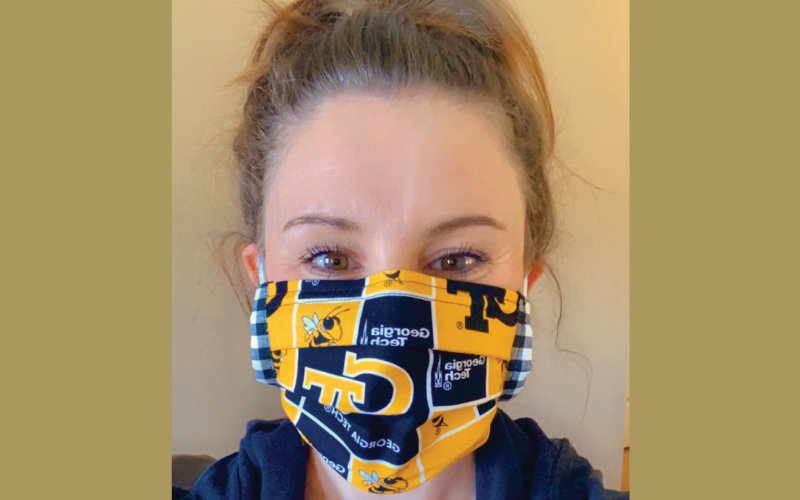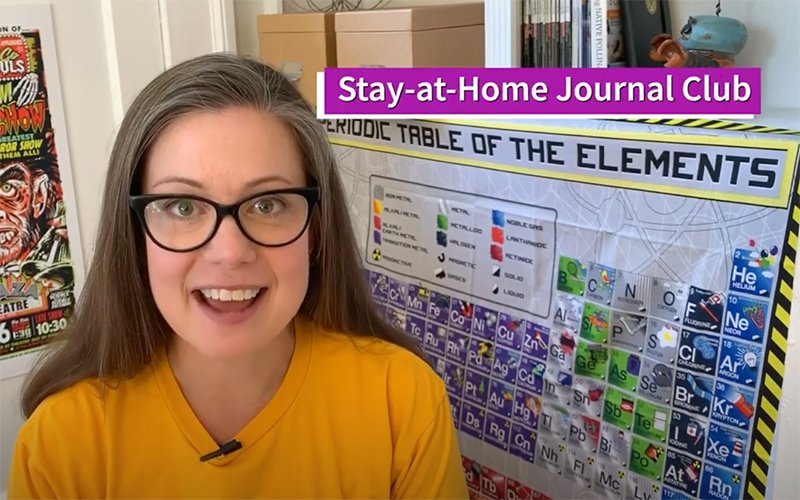This story initially appeared on the website of the Georgia Tech Alumni Magazine. Content has been modified for the College of Sciences website.
Many challenges imposed by the pandemic have called for cutting-edge solutions from scientists, engineers, and researchers. With the technical expertise and know-how to handle such challenges, Georgia Tech alumni have become an unyielding force in the fight against the virus.
Engineers are retooling production lines to manufacture millions of face masks. 3D-printing hobbyists are banding together to print face shields. Computer scientists are collecting data to help researchers track the spread of the virus. And, Georgia Tech alumni are even helping distilleries switch from making spirits to hand sanitizer for emergency responders.
Below are the College of Sciences alumni who are working to fight the virus in the hospital and at home. From producing facemasks, to creating an online journal club, to working as an anethesiologist, they are all using their skills to give back to others.
Charley Winter, Bio 12
The fear of bringing the virus home to loved ones has pushed many frontline healthcare workers out of their homes and apartments.
“It’s not uncommon for people in our situation to have separate living arrangements. That’s something we have to deal with added on to the acuity of the cases we’re dealing with at work,” says Charley Winter, Bio 12.
Winter, who is an anesthesiologist assistant, hasn’t been back to his apartment that he shares with two roommates in downtown Atlanta since the pandemic began. He’s currently living in a spare bedroom and using a spare bathroom on the opposite end of his girlfriend’s apartment.
Winter works in private practice with Physicians Specialists in Anesthesiology, which contracts with Emory Saint Joseph’s Hospital.
His team is working with COVID-19 patients and those suspected of having the disease. He’s been amazed at the support for healthcare workers from the local community, including donations of personal protective equipment. Some members of his practice have received 3D-printed face shields from Georgia Tech engineering students.
“That’s been incredible. Tech students helping out Tech alumni,” Winter says.
Winter says he and his team are doing well under the circumstances. “We have open communication on a daily basis about patients, the numbers are stabilizing, and testing is speeding up,” he says.
His practice group, which was split into two teams for safety, has been meeting virtually for weekly check-ins.
“It’s hard not to bring all the stories with you when you come home,” he says. “So, it’s nice to talk with other members of our practice to get feedback and personal counseling. I’ve been doing ok, but I don’t have the same exposure that others have had.”
Kathryn Lanier, PhD Chem 17
Kathryn Lanier, PhD Chem 17, is a STEM Education Outreach Director for Southern Research, a non-profit science and engineering organization. For her, the COVID-19 pandemic has underscored the importance of STEM education.
“We run a statewide STEM education program for K-12 students. One of the field trips we do is an infectious disease field trip and it’s so close to what’s happening now,” she says.
During the field trip, students take on the role of an epidemiologist, tracing a viral outbreak, and conducting experiments to test for a virus.
“Not everyone will grow up to be a scientist or engineer, but everyone will live through something like this,” Lanier says. “I think it’s important to have a basic understanding of the science so we can all respond intelligently.”
Since the pandemic began, Lanier has been sewing and donating face masks to the Children’s Hospital of Alabama. She’s also sewn several masks with the Georgia Tech logo-patterned fabric for fellow Tech alumni.
“I saw people in Georgia masking face masks and I wanted to do something to contribute, so I pulled out my sewing machine, too,” she says.
Jennifer Kraft Leavey, Chem 95
Staying home is one of the most important ways that the public can stop the spread of the coronavirus. As everyone learns to connect virtually, Jennifer Kraft Leavey, Chem 95, came up with an idea to maintain connections in the science community while spreading accurate information about COVID-19.
She launched a “Stay At Home Journal Club” to share brief online videos of peer-reviewed research papers.
“I started getting a lot of questions from people about the virus. At the same time, we began working remotely, and I think we are all feeling a little disconnected from our peer groups,” Leavey says.
Leavey is principal academic professional in Georgia Tech’s College of Sciences and teaches cell biology.
Using the hashtag #SAHJC, she’s inviting fellow researchers and scientists to read a peer-reviewed journal and record themselves in a 2-minute video explaining the main points of the article.
Her first videos address papers discussing the test for antibodies against the coronavirus, case studies of pediatric COVID-19 patients, and coronavirus in cats.
“I think especially right now, when there’s so much data coming out about the rate of infections, it can make people afraid. But, it’s important to also focus on the fact that we’re seeing exponential growth of the research on the virus. We’re learning more and more about it every day,” Leavey says.
By: Jennifer Herseim
For More Information Contact
Grace Pietkiewicz
Communications Assistant
College of Sciences
katiegracepz@gatech.edu





